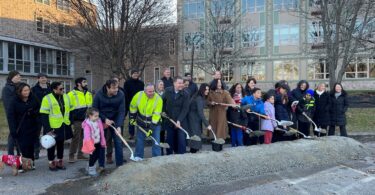West borough, MA – Northeastern University economist Alan Clayton-Matthews today told MassEcon members that most earners in Massachusetts will benefit at least modestly from recent U.S tax policy changes and that looking ahead the key economic constraint in the Commonwealth is a lack of labor.
“In Massachusetts, most people will probably win out a little bit” as a result of the recently enacted federal income tax changes, Clayton-Matthews told the 2018 annual kickoff meeting of MassEcon members. The state will have essentially full employment through 2021, he said, but with somewhat reduced traditional migration to the state, “employment growth will be constrained by the number of available workers.”
Clayton-Matthews spoke as MassEcon, the Commonwealth’s partner in promoting business and locations in the state, celebrates its 25th year of success in 2018. Clayton-Matthews reflected on thestate of the economy in 1993 and compared it to the quarter century since MassEcon was founded.
Clayton-Matthews, Professor at Northeastern University and New England Economic Partnership Forecast Manager, addressed “The Massachusetts Economy: 1993, Today, and 2021.” This is the 16thyear that Clayton-Matthews has delivered an economic assessment and forecast at the organization’s January members meeting.
Recalling 25 years ago, Clayton-Matthews said the recent recession that began in 2008 “was nothing compared to” 1993’s, when unemployment was 8 percent and two of Boston’s biggest banks teetered and one went out of business. “Back then you didn’t think there’d be any future to the state,” he said.
However, Massachusetts has recovered and is now in the second longest recovery since the industrial revolution, he said. “It doesn’t show any signs of ending.”
The first three-quarters of last year saw “continued, steady growth for Massachusetts,” he said.
Labor force participation was actually higher in the ‘90s than today, Clayton-Matthews said, partly because so many women came into the workforce during that decade and also because today many men are aging out of their prime working years.
Massachusetts is significantly ahead of the national average in levels of educational attainment statewide, he said, though the Boston-Cambridge area is ahead of the rest of the state. Massachusetts’s educational lead in 4-year college graduates over the country as a whole has increased from 7.5 percentage points in 1990 to 11 percentage points today, and the gap continues to grow.
The fastest growing sectors in the Massachusetts economy are construction, professional and business services, and leisure and hospitality. Education and health continue to grow modestly, and government “barely grew at all,” he said, and then only at local levels.
The economy’s losers in terms of employment are the information sectors, made up of software, which was up slightly, and journalism and publishing, which saw a more than 4 percent decline.
Population growth will be low, about half a percent a year, but steady through 2021, he said, which is one reason for the constrained labor supply. Unemployment is about 3.5 percent now and “can’t go lower,” he said. “Improvements in productivity will enable output and incomes to grow faster than employment,” he said. “Labor shortages should finally result in wage increases.”
While Clayton-Matthews noted that most Massachusetts workers will benefit at least a small amount with the recent U.S. tax code changes, he said those at the very top will gain more on a percentage basis than those in the middle and at the bottom. That is true even though limits were placed on the amount of local and state taxes paid that can be deducted from a worker’s federal tax liability.
No discussion of the Massachusetts economy is complete these days without a mention of Amazon’s search for a second North American headquarters, and Boston made the top 20 candidates this week. “We don’t need Amazon, but if we get Amazon we’ll get the workers and get transportation fixed,” he predicted.
Amazon has said it would add 50,000 workers over 10-15 years to a new second headquarters. Massachusetts typically adds about 50,000 new workers a year, Clayton-Matthews said.
Clayton-Matthews is also co-editor of Massachusetts Benchmarks, a joint publication of UMass and the Federal Reserve Bank of Boston that presents timely information and analysis about the performance of the Massachusetts economy.










